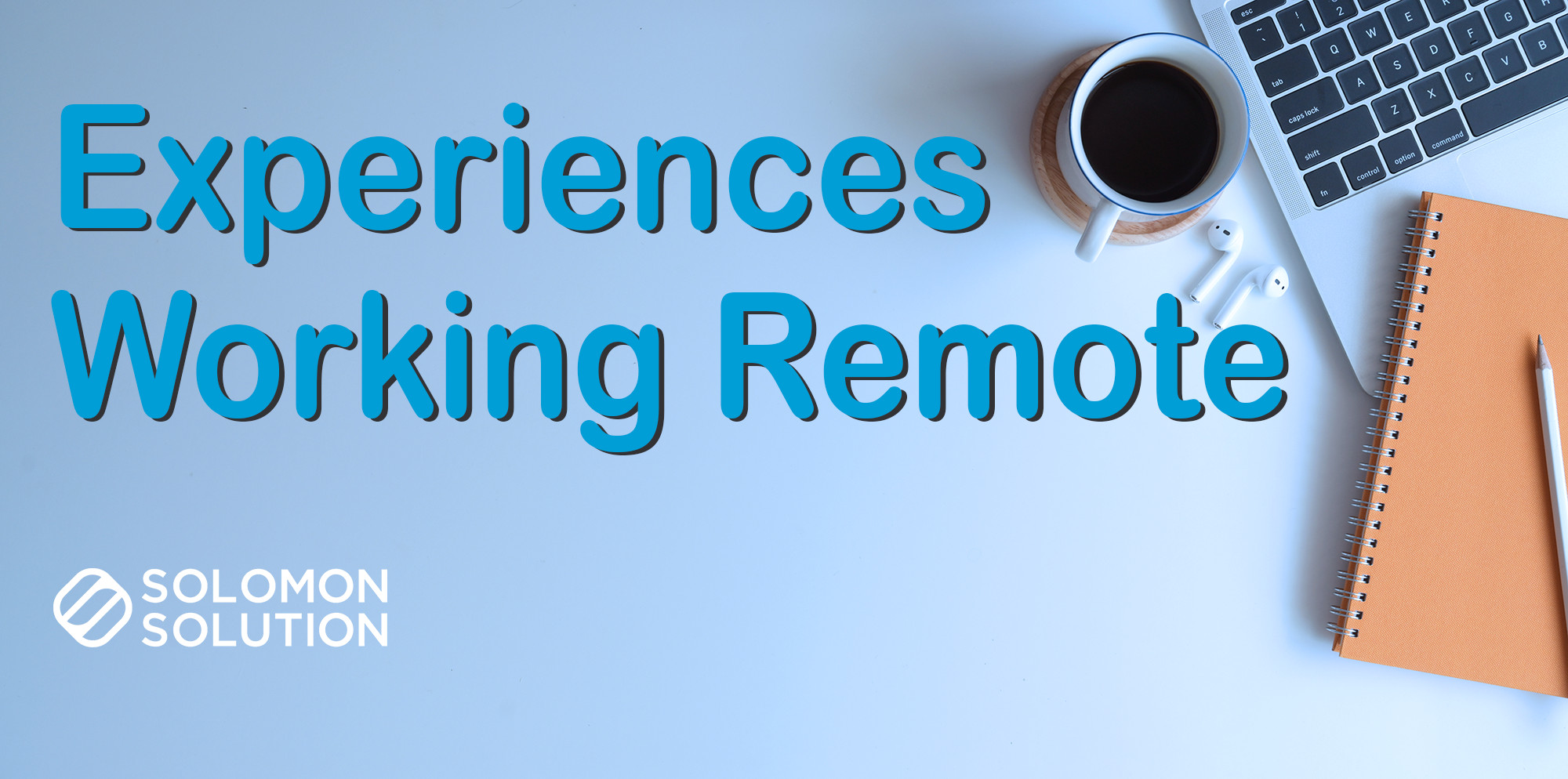
If you are about to join a remote team, then you may have some anxiety about taking the first step into this new working space. Your office job offers the random (or strategic) hallway encounters to talk about a project, separation of work and home life, or an office decorated to make it feel like home.
Your mind might be cluttered with a multitude of questions. How am I going to adjust? What are meetings like? Will I be able to be as productive as I was while working in an office? Where will I work? These are all valid questions and have crossed the minds of almost every Solomon hire coming from an office environment.
Working remote is a huge adjustment. We would like to take a moment to share our experiences with you, as well as the best tips for taking the plunge. So, when it comes time for you to evaluate a remote position, you might be better prepared to decide if it’s the right choice for you.
Team Communication
The first hurdle that normally arises when starting a remote position is learning how to communicate with your new team effectively. At Solomon, this is a hurdle that we face daily and requires constant tweaking and readjustment from the team to work out effective strategies. It can feel like you’re on an island at first and may become overwhelming at times, trying to figure out how you’re going to accomplish something or how to just get started. In a remote environment, not talking to people for days can become a common occurrence if you don’t take the necessary steps to prevent it.
Put time on your calendar to reach out to people either through email or instant messaging platforms like Microsoft Teams. We have Teams channels devoted to chatting throughout the day—channels devoted to specific projects and initiatives, a channel for just brainstorming, as well as a random channel unrelated to work such as new baby pics, funny articles, and trip updates.
We also have weekly and daily syncs for the team to meet and discuss projects to ensure we don’t lose sight of what everyone is working on. Don’t be afraid to just reach out to team members and ask what they are up to—you can still have impromptu meetings with your team similar to an office environment.
Maintaining a Schedule and Workspace
Starting a remote position can be an intimidating opportunity. Remote work requires a certain attitude and discipline to maintain a relevant and timely work schedule. In a remote environment, there is no one looking over your shoulder or micromanaging. This means it falls on you to ensure you are maintaining a productive work schedule and balancing your workload responsibly to meet your commitments and deliver on time.
At Solomon, team members work diligently to maintain visibility for each other. When a team member reaches out for help or requests insight and feedback, typically one or several Solomon team members jump to offer aid or expertise. Over time this builds trust, which is, from our experience, the foundation of a productive remote environment. If we can’t trust team members to get things done, the system becomes fragile, and accomplishing projects becomes stressful and tedious.
Where you work is equally important; working in a remote environment may, at times, require you to be flexible. This is something that several new and old Solomon team members struggle with and work through continuously. Setting up a space to work in your home is critical, as your home and work can become one and the same, opening the door to working late into the night. This isn’t a problem if it’s occasional, but if it starts to become a habit, then it can begin to feel like you can’t escape work. It is now a fact of life that disconnecting from work is difficult at best in the modern world whether you are remote or are in an office.
Working from home doesn’t have the same restrictions working in an office has—you have to go home to feed your dog, take your kids to an event, or cook dinner. In a remote environment, you can accomplish these things and then go right back to work. But be careful not to create to many temptations, it can start to feel like there is too much on your plate. Finding a dedicated work space from home can help you differentiate your work and home life, and allow you to close off that space when you don’t need it.
Team Insights and Tips
Here are a few experiences and tips from the team on working in a remote position:
Austin Stephens
What is one misconception that you had about working remote before you started?
I thought working remote would stifle my productivity, as I wouldn’t also have access to the right resources to complete my projects. I was wrong—literally everything is accessible from my computer. I’ve found that I now am more independent, and I do more work upfront on the project to identify potential blockers so I don’t lose momentum waiting for someone. It is something I didn’t do as much when I was working in an office.
Monica Zunick
What is one misconception that you had about working remote before you started?
I thought that the biggest thing I would miss is the aspect to socialize in the office and not have comradery with my team. I found that this hasn’t been an issue at all. With our weekly video calls and messaging platforms used throughout the day, I have gotten to know my coworkers and I really enjoy them. I like working remote a lot more than I ever would have expected!!
What is the best tip you can give someone who is about to start working remote?
The best tip I can give someone who is about to start working remote, is to advocate for what you need when it comes to your workspace. Having a home office was not an option for me. When I interviewed, I made sure that I would be able to have a WeWork membership as a space to work from. I found that the hot desk at WeWork worked fine until I started to work on client-facing things. Now have my own office at WeWork which allows me to be more productive with my work.
Mia Greenberg
What was the first challenge you faced when you began working remote?
When I first began working remote it was super difficult to understand the patterns and working style of other people in the company—everything from the tool and frequency that was best to get a hold of folks to how to ask for help or clarity or direction. By observing your other team member’s communication styles, eventually, it becomes clear, but it is very different than being in the same room or building as your team members for 40 hours right off the bat.
What is the best tip you can give someone who is about to start working remote?
Be honest with yourself about what is working for you and what is not. Not everyone will find success with the same habits, so be easy on yourself if what’s working for other people doesn’t bring you the same success. Thinking outside the box to find what set up or habits you need can be fun. For me, I found meditating ten minutes before I jump online can really make my mind tune from home things to work things.
McKell Cousins
What was the first challenge you faced when you began working remote?
The first challenge I faced was balancing time for work and personal life. For me, I can get carried away with work, not even realizing it is 6pm and I have been working since 7am. With a client on Pacific Time, I start my days a bit later around 8/9am for the client since they typically start working then. That would give me time to work on internal things if needed and then dive into client work once they are online.
What is one misconception that you had about working remote before you started?
I thought working remote was going to feel like I was on an island all alone and wouldn’t learn much since I wouldn’t see people day to day. I was 100% wrong in my judgment!! I have learned and grown more in the past year, working from home vs. 3 years working in an office.
Trent Cross
What is one misconception that you had about working remote before you started?
I thought you must be available all the time during ‘normal’ business hours; at your desk, ready to respond to any emails, phone calls, IM messages, etc. right away. The feeling that if you are not responding immediately or quickly, then others may think you’re not working. But you need to take breaks, eat, walk, go to personal appointments, etc. just like you do at an office location. It’s not any different, and people don’t expect you to respond immediately.
What is the best tip you can give someone who is about to start working remote?
Set up a dedicated space in your home, preferably a room that has a door you can close for privacy and eliminate other home distractions. Make sure you set aside time to collaborate and communicate with other team members regularly. With video chat tools, it is easy to ‘see’ someone and chat, whether it’s a scheduled meeting or a one-off discussion. Using video helps to build a sense of togetherness and good to see faces.
Jake Anderson
What was the first challenge you faced when you began working remote?
Not having a real office at home was a big struggle. I had a desk and a chair, but it was in the living room of our 650sq. ft. apartment, so it was difficult transitioning from home brain > work brain and back at the end of the day. Once I was able to set up an office in it’s own room, my productivity and work/life balance skyrocketed.
What is one misconception that you had about working remote before you started?
Having worked office jobs where WFH (Work-from-Home) was almost a sarcastic term, and it was widely accepted that a WFH day was basically just a day off without using PTO. I was concerned that the same would be true for this full remote job. I have found quite the opposite—I am much more productive at home, and by nature, a full remote workforce allows only the focused, driven, and productive team members to survive, which is exactly the humans I want to work with!
Kele Powell
What is one misconception that you had about working remote before you started?
I thought that it would be easy to get distracted at home, causing less productivity throughout the day. I had my own dedicated office from the time I started, so it was actually pretty easy to get into the motion of “being in my home office means I’m at work, not at home.“
What is the best tip you can give someone who is about to start working remote?
The biggest tip that I would give to a person starting their remote journey is to bug as many people on their team and not to hesitate. It can be daunting when you’re starting off a job with a bunch of strangers that you have never even seen before, but any good teammate will be more than happy to talk to you about what they are working on, and even let you shadow them.
Veronika Boos
What was the first challenge you faced when you began working remote?
Honestly, the only issue for me that is even big enough to be worth mentioning is missing the community and friendships that are gained when you work together in person. Getting to know everyone better and hang out outside of work is great, not that my season of life allows for very much of that!!
What is the best tip you can give someone who is about to start working remote?
It seems to me it’s 99% personality, work experience/style, lifestyle, and living situation) that will determine whether someone will like working remote. These are all concrete things that will look different for everyone. Someone who always needs to be told what to do and prefers to do all their work in a team environment is probably not going to do well regardless. My tip is to evaluate your needs and habits before you dive into it!
Hopefully, this helps you feel more prepared for working in a remote work environment. The freedom of a remote working situation can really open you up to be the most creative version of yourself and allow you to be present in important moments of your life—like being available to be around your newborn or spending time with family that would otherwise not be possible in an office environment. If you are looking at moving your team remote or taking a remote position, just remember it is an adjustment and will take time, and hopefully, these insights help you adjust as you learn the new ins-and-outs of your job.
If you have any more questions, take a look at Monica’s blog that has more insights on working remote.

